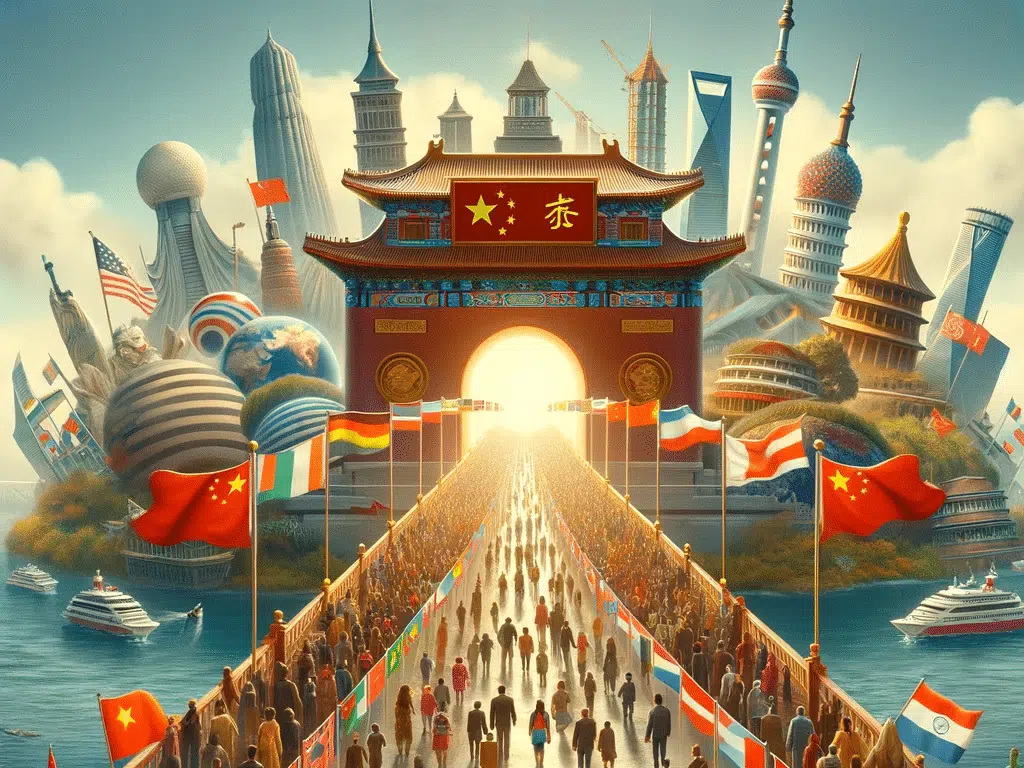A New Era in Travel and Diplomacy – China’s Welcoming Gesture:
In an unprecedented move, China has recently announced a visa-free entry policy for citizens of France, Germany, Italy, the Netherlands, Spain, Malaysia and Norway. This temporary exemption, effective from December 1st (2023), aims to rejuvenate the tourism sector and strengthen international relations post-pandemic. This initiative not only simplifies travel for many but also marks a significant step in China’s efforts to boost global perception and economic ties.

Reviving Tourism: China’s Open Door Policy
The new policy allows citizens of these countries to enter China for business, tourism, or visiting friends and relatives without the need for a visa for stays up to 15 days. This decision is part of China’s broader strategy to revive its tourism industry, severely impacted by strict COVID-19 measures. With international flight routes being restored, the country is eagerly anticipating a resurgence in foreign visitors.
Building Bridges: Improving Global Perception
China’s initiative is also seen as a move to enhance its global image, which has faced challenges in recent years. Surveys have indicated a need for China to rebuild its international reputation. This visa-free policy could be a step towards addressing these concerns, promoting a more positive image globally.

A Historical Perspective: China’s Evolving Visa Policies
China’s visa policies have undergone significant transformations, mirroring the nation’s changing approach to international relations and global integration. Historically, during the imperial era and much of the 20th century, China was known for its insular policies, limiting foreign interactions. However, post-1978, with the opening of China’s economy, there was a gradual shift towards more inclusive visa regulations.
The Reform Era: Easing Entry Requirements: The 1980s and 1990s marked a pivotal period in China’s visa policy history. With economic reforms and a desire to attract foreign investments, China began easing entry requirements. Tourist visas became more accessible, and business visas were introduced to facilitate economic partnerships. This era laid the groundwork for China’s current approach to global engagement.
21st Century Shifts: Balancing Security and Openness: In the 21st century, China continued to fine-tune its visa policies, balancing national security concerns with its ambitions to be a global hub for tourism and business. The introduction of e-visas and visa-on-arrival for select countries indicated a move towards more traveler-friendly policies, making it easier for tourists and businesspeople to visit China.
Economic Implications: A Boon for Business and Trade
The visa exemption is expected to boost not only tourism but also economic exchanges. German and French industry representatives have expressed optimism about this development. The ease of travel will facilitate business interactions, quality assurance, and the maintenance of international trade relations, particularly benefiting sectors reliant on personal contacts and high-quality standards.
A Progressive Step: Beyond COVID-19
China’s decision follows the elimination of COVID test requirements for inbound travelers and the resumption of visa-free entry for citizens of Singapore and Brunei. These measures reflect China’s progress in moving beyond the pandemic and reopening its borders to the world.
China’s visa policies have also been responsive to global events, particularly health crises like the SARS outbreak in 2003 and the COVID-19 pandemic. These events led to temporary tightening of visa regulations, reflecting China’s cautious approach to managing international travel during health emergencies. However, the recent easing of visa restrictions post-COVID-19 signals China’s readiness to reconnect with the world.
Conclusion: A Step Towards a More Connected World

China’s visa-free entry policy represents a significant move towards fostering a more interconnected global community. It’s a gesture that promises to enhance cultural exchanges, bolster tourism, and strengthen economic ties. As the world gradually recovers from the pandemic, such initiatives are vital in rebuilding and renewing international relationships.
For more information on international travel policies and updates, visit World Travel and Tourism Council.
- National Parks in Montana: A Traveler’s Paradise - June 2, 2024
- National Parks in Arizona: Discover the Wonders - June 2, 2024
- Yucatan National Parks - June 2, 2024
